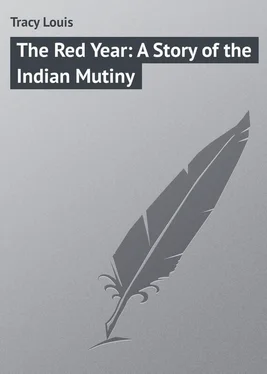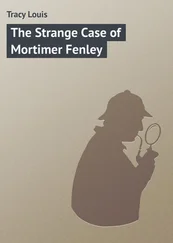Louis Tracy - The Red Year - A Story of the Indian Mutiny
Здесь есть возможность читать онлайн «Louis Tracy - The Red Year - A Story of the Indian Mutiny» — ознакомительный отрывок электронной книги совершенно бесплатно, а после прочтения отрывка купить полную версию. В некоторых случаях можно слушать аудио, скачать через торрент в формате fb2 и присутствует краткое содержание. Жанр: foreign_prose, на английском языке. Описание произведения, (предисловие) а так же отзывы посетителей доступны на портале библиотеки ЛибКат.
- Название:The Red Year: A Story of the Indian Mutiny
- Автор:
- Жанр:
- Год:неизвестен
- ISBN:нет данных
- Рейтинг книги:5 / 5. Голосов: 1
-
Избранное:Добавить в избранное
- Отзывы:
-
Ваша оценка:
- 100
- 1
- 2
- 3
- 4
- 5
The Red Year: A Story of the Indian Mutiny: краткое содержание, описание и аннотация
Предлагаем к чтению аннотацию, описание, краткое содержание или предисловие (зависит от того, что написал сам автор книги «The Red Year: A Story of the Indian Mutiny»). Если вы не нашли необходимую информацию о книге — напишите в комментариях, мы постараемся отыскать её.
The Red Year: A Story of the Indian Mutiny — читать онлайн ознакомительный отрывок
Ниже представлен текст книги, разбитый по страницам. Система сохранения места последней прочитанной страницы, позволяет с удобством читать онлайн бесплатно книгу «The Red Year: A Story of the Indian Mutiny», без необходимости каждый раз заново искать на чём Вы остановились. Поставьте закладку, и сможете в любой момент перейти на страницу, на которой закончили чтение.
Интервал:
Закладка:
As soon as Malcolm left, however, Mr. Mayne loaded all his guns, while Winifred made more successful search for some of the servants. The Afghan was true to his salt, and their own retainers, who had come with them from Lucknow, remained steadfast at this crisis. Hence, the mob received a warm reception, but the fighting had taken place outside the bungalow, the defenders lining a wall at the edge of the compound. Indeed, a score of bodies lying there had not been seen by Malcolm during his first frenzied examination of the house.
Then an official of the Salt Department, driving past with his wife and child, shouted to Mr. Mayne that he must not lose an instant if he would save his niece and himself.
“The sepoys have risen,” was the horrifying message he brought. “They have surprised and killed all the white troops. They are sacking the whole station. You see the fires there? That is their work. This road is clear, but the Delhi road is blocked.”
Some distant yelling caused the man to flog his horse into a fast trot again; and he and his weeping companions vanished into the gloom.
Mayne could not choose but believe. Indeed, many days elapsed before a large part of India would credit the fact that the British regiments in Meerut had not been massacred. A carriage and pair were harnessed. Several servants were mounted on all the available horses and ponies, and Mr. Mayne and Winifred had gone down the Grand Trunk Road towards Bulandshahr and Aligarh.
“Going half an hour,” said Syed Mir Khan, volubly. “I stand fast, slaying budmashes. They make rush in thousands, and I retreat with great glory. Then they put blazes in bungalow.”
Now, Malcolm also might have accepted the sensational story of the Salt Department inspector, if, at that instant, the boom of a heavy gun had not come from the direction of the sepoy parade-ground. Another followed, and another, in the steady sequence of a trained battery. As he had just ridden from that very spot, which was then almost deserted, he was sure that the British troops had come from their cantonment. The discovery that Winifred was yet living, and in comparative safety, cleared his brain as though he had partaken of some magic elixir. He knew that Meerut itself was now the safest refuge within a hundred miles. Probably the bulk of the mutineers would strive to reach Delhi, and, of course, the dragoons and artillery would cut them off during the night. But he had seen many squads of rebels, mounted and on foot, hastening along the Grand Trunk Road, and it was no secret that detachments of the 9th Native Infantry at Bulandshahr and Aligarh were seething with Brahminical hatred of the abhorred cartridges.
Each second he became more convinced that Winifred and her uncle were being carried into a peril far greater than that which they had escaped. Decision and action were the same thing where he was concerned. Bidding the Afghan endeavor to find Captain Craigie, who might be trusted to send a portion of his troop to scour the road for some miles, and assuring the man of a big reward for his services, Frank mounted and galloped south. He counted on overtaking the fugitives in an hour, and persuading them to return with him. He rode with drawn sword, lest he might be attacked on the way, but it was a remarkable tribute to Möller’s wisdom in offering to ride to Delhi that no man molested him, and such sepoys as he passed skulked off into the fields where they saw the glint of his saber and recognized him as a British officer. They had no difficulty in that respect. A glorious full moon was flooding the peaceful plain with light. The trunks of the tall trees lining the road barred its white riband with black shadows, but Nejdi, good horse that he was, felt that this was no time for skittishness, and repressed the inclination to jump these impalpable obstacles.
And he made excellent progress. Eight miles from Meerut, in a tiny village of mud hovels which horse and rider had every reason to remember, they suddenly dashed into a large company of mounted men and a motley collection of vehicles. There were voices raised, too, in heated dispute, and a small crowd was gathered near a lumbering carriage, whose tawdry trappings and display of gold work betokened the state equipage of some native dignitary.
Drawn up by its side was a European traveling barouche, empty, but Malcolm’s keen eyes soon picked out the figures of Winifred and her uncle, standing in the midst of an excited crowd of natives. So great was the hubbub that he was not noticed until he pulled up.
“I have come to bring you back to Meerut, Mr. Mayne,” he cried. “The mutiny has been quelled. Our troops are in command of the station and of all the main roads. You can return without the slightest risk, I assure you.”
He spoke clearly and slowly, well knowing that some among the natives would understand him. His appearance, no less than his words, created a rare stir. The clamor of tongues was stilled. Men looked at him as though he had fallen from the sky. He could not be certain, but he guessed, that he had arrived at a critical moment. Indeed, the lives of his friends were actually in deadliest jeopardy, and there was no knowing what turn the events of the next minute might have taken. But a glance at Winifred’s distraught face told him a good deal. He must be bold, with the careless boldness of the man who has the means of making his will respected.
“Stand aside, there!” he said in Hindustani. “And you had better clear the roadway. A troop of cavalry is riding fast behind.”
He dismounted, drew Nejdi’s bridle over his left arm, and went towards Winifred. The girl looked at him with a wistfulness that was pitiful. Hope was struggling in her soul against the fear of grim death.
“Oh, Frank!” she sighed, holding out both her hands. “Oh, Frank, I am so frightened. We had a dreadful time at the bungalow, and these men look so fierce and cruel! Have you really brought help?”
“Yes,” he said confidently. “You need have no further anxiety. Please get into your carriage.”
Mr. Mayne said something, but Malcolm never knew what it was, for Winifred fainted, and would have fallen had he not caught her.
“This Feringhi has a loud voice,” a man near him growled. “He talks of cavalry. Where are they?”
“The Meerut road is empty,” commented another.
“We have the Begum’s order,” said the first speaker, more loudly. “Let us obey, or it may be an evil thing for us.”
“One of the daughters of Bahadur Shah is here,” murmured Mayne rapidly. “She says we are to be taken to Delhi, and slain if we resist. Where are your men? My poor niece! To think that I should have brought her from England for this!”
Malcolm, still holding Winifred’s unconscious form clasped to his breast, laughed loudly.
“Mayne-sahib tells me that you have all gone mad,” he shouted in the vernacular. “Have you no ears? Did you not hear the British artillery firing on the rebels a little time since? Ere day breaks the road to Delhi will be held by the white troops. What foolish talk is this of taking Mayne-sahib thither as a prisoner?”
The door of the bedizened traveling-coach was flung open, and the Mohammedan lady who had befriended Frank when he fell into the moat appeared. She alighted, and her aggressive servants drew away somewhat.
“It is my order,” she said imperiously. “Who are you that you should dispute it?”
“I regret the heat of my words, Princess,” he replied, grasping the frail chance that presented itself of wriggling out of a desperate situation. “Nevertheless, it is true that the native regiments at Meerut have been dispersed, and you yourself may have heard the guns as they advanced along the Delhi road. Why should I be here otherwise? I came to escort my friends back to Meerut.”
Читать дальшеИнтервал:
Закладка:
Похожие книги на «The Red Year: A Story of the Indian Mutiny»
Представляем Вашему вниманию похожие книги на «The Red Year: A Story of the Indian Mutiny» списком для выбора. Мы отобрали схожую по названию и смыслу литературу в надежде предоставить читателям больше вариантов отыскать новые, интересные, ещё непрочитанные произведения.
Обсуждение, отзывы о книге «The Red Year: A Story of the Indian Mutiny» и просто собственные мнения читателей. Оставьте ваши комментарии, напишите, что Вы думаете о произведении, его смысле или главных героях. Укажите что конкретно понравилось, а что нет, и почему Вы так считаете.












